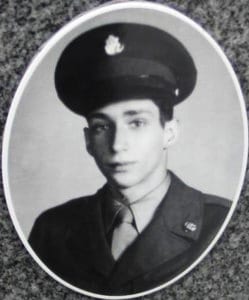
CPL Morris Meshulam’s name on the “Court of the Missing” at the Honolulu Memorial
By Anna Selman, Programs and Public Relations Coordinator
UPDATE WASHINGTON – On September 23, Army Cpl. Morris Meshulam remains were buried in Indianapolis. Meshulam died at the age of 19 in 1950 from malnutrition, frostbite and gangrene after being captured as a Prisoner of War (POW) during the Korean war.
UPDATE 9/14/2018 – JWV has been made aware that the ceremony will take place on Sunday, September 23rd at Etz Chaim Cemetery in Indianapolis, Indiana. All those who wish to attend the ceremony should contact the Etz Chaim Synagogue ensure there is enough space. JWV has ensured that a JWV member will be in attendance to be there for our battle buddy. For any more questions, please email us at jwv@jwv.org.
WASHINGTON – On June 4, 2018, JWV received a notification from the U.S. Army that the remains of CPL Morris Meshulam had been identified. CPL Meshulam, who died 67 years earlier, was born in Indianapolis, Indiana on July 11, 1931 to Sam and Pauline Meshulam. His parents were founding members of the Etz Chaim Congregation, which is a small community of Sephardic Jews in Indianapolis. According to the family, Moe dropped out of High School when he was 18 to sign up for the Army.
The little that we know of CPL Meshulam, or Moe as he liked to be called, comes from his surviving family – his sister Rose and his nephews Sam and Morris. Rose was contact by Army a couple of weeks ago, and she was in “total shock” that her baby brother was finally found. CPL Meshulam’s brother Jack and his twin sister Rae gave their DNA to DOD officials to 2006 to help identify Moe’s body. Finally, Jack, Moe and Rae will finally be brought together in the family plot in Indianapolis later this year.
From what we do know about CPL Meshulam’s service, he completed basic training, and afterwards, he was sent to Korea to be part of Battery D of the 82nd Anti-Aircraft Battalion in the 2nd Infantry Regiment on July of 1950. His first battle must have been on August 31st when the North Koreans attacked their position on the Nantong River Line, which resulted in a 16-day battle that ended up with the unit gaining more territory for United Nation forces. It is likely that after this battle Meshulam was promoted to Corporal.

CPL Morris Meshulam in uniform.
His Division was within fifty miles of the Manchurian border when Chinese forces entered the fight, and during the Battle of the Ch’ongch’on River, his unit’s mission was to protect the rear and right flank of the Eighth Army as it retreated to the South. After this battle, while surrounded and outgunned, CPL Meshulam’s Battery fought through what later was known as “The Gauntlet” – a valley where UN forces faced road blocks and heavy fire from Chinese forces. His unit lost nearly one third of its remaining soldiers. CPL Meshulam was captured in the Gaunlet near Kunu-ri on December 1, 1950 and taken as a Prisoner of War. He later died in January 11th of 1951 either from severe malnutrition or injuries that he received during the battle.
The remains of soldiers that died in North Korea were returned by the North Koreans in two waves: one in 1954 (also known as Operation Glory) and another from 92-94. It is estimated that out of the 4,219 bodies that were returned, 416 bodies were unable to be identified. All unidentified soldiers were placed in the Punchbowl Cemetery in Honolulu, Hawaii. The DoD has led a massive effort to identify the remains of these soldiers – about 90 military researchers are currently working at labs in Hawaii, Nebraska and Ohio to identify the bones of Americans as we speak. The number varies from year to year, but they approximately identify around 30-50 remains a year through advanced DNA techniques. Since CPL Meshulam’s remains have been accounted for, a rosette will be placed next to his name on the “Court of the Missing” at the Honolulu Memorial to mark that he now rests in a known gravesite.
JWV is grateful to the Department of Defense, the U.S. Army and the Korean War Project for ensuring that CPL Morris Meshulam can finally come home. Although we do not have a date yet, we have been in contact with the family, and we have shared our sympathies and support for them. We have been in contact with the Department Commander of Ohio, who has stated that they are committed to being at the funeral when it takes place. Our goal at JWV is to ensure that each and every veteran is able to come home, and we are so glad that after 67 years, we can finally say that CPL Morris Meshulam is coming home.
Volume 72. Number 2. Summer 2018

